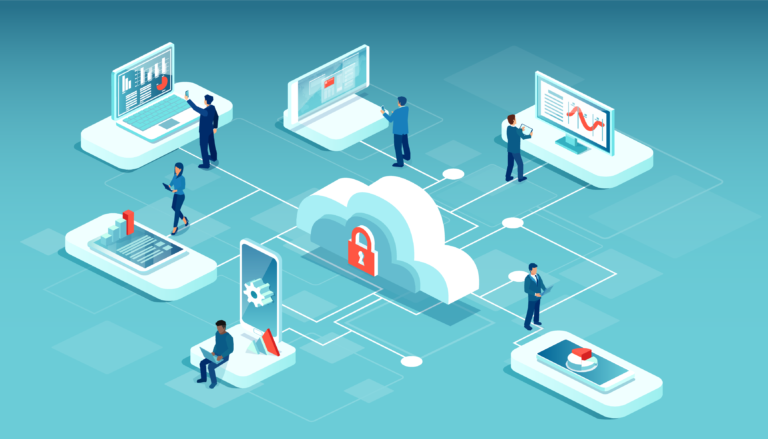Normal 0 false false false EN-CA X-NONE X-NONE Cloud Security Issues & Challenges: A Guide for Construction Companies
Cloud computing is the foundation for a more efficient construction business
Construction companies are adopting cloud computing at an exponential rate (refer to The Complete Guide to Cloud Computing blog article) because digital tools help connect teams with real-time information so they can make smart decisions more quickly and enjoy greater productivity.
While cloud-based collaborative networks allow companies to use the intelligent analytics and streamlined communication to improve their ability to meet project scheduling and budget goals, a balanced assessment of security, accessibility and flexibility is necessary to reap those technology gains while eliminating possible data comprise and loss.
If it’s time for you to move your construction business into the cloud, you will want to make sure that your solution provides connectivity and reach without sacrificing the integrity of your business critical information. Often, the one thing that holds a construction company back is fear of cloud insecurity, so we’re taking a deep-dive into areas a construction company should review and discuss with a potential solution provider to ensure a successful transition to digital and beyond.
Security considerations for moving to the cloud
Cybercrimes, ransomware and viruses can devastate a company, but a solid, secure and advanced cloud ERP delivers controls to mitigate these risks… and you should ask a potential solution provider about them.
1) Password settings – Your ERP provider should be able to help you identify and implement advanced configurations and enforceable policies to keep your mission-critical data secure and only accessible by the appropriate parties. Information sharing, sending and storing should be available on-demand but also safe throughout its lifespan.
2) Firewall settings – Make sure your cloud-based ERP includes firewall settings to protect against infiltration and capture of data by non-sanctioned intruders. Your solution provider should be able to create and deliver a system that offers you a safe environment to input, modify and utilize company information – from the job site to the back office – without worrying about constant breach.
3) Authentication – It has become more and more common to leverage MFA (multi-factor authentication) to keep data secure. Your cloud-based ERP provider should have several recommendations to ensure only verified personnel access data, and only access that data required by their authorization level within the organization or the project on which they are working.
4) Packet filtering – A firewall technique used to control network access by monitoring outgoing and incoming packets and allowing them to pass or halt based on the source and destination Internet Protocol (IP) addresses, protocols and ports, packet filtering is another layer of security that can fortify your company’s data.
5) SSL Connection – SSL, or Secure Sockets Layer, is a security protocol that creates an encrypted link between a web server and a web browser, keeping internet connections secure and preventing criminals from reading or modifying information transferred between two systems. Construction companies rely on SSL for safe communication in an unsure cyber world.
Additionally, you’ll want to ensure that your ERP solution provider has any number of various security software and hardware solutions in place at what will become your data center to manage, monitor and protect systems from loss and hacking, as well as keep you in compliance.
6) Data center security, certifications and standards – Because of their robust nature and advanced technology, a Tier III data center requires no shutdowns for equipment replacement and maintenance. A redundant delivery path for power and cooling is added to the redundant critical components of Tier III so that each and every component needed to support the IT processing environment can be shut down and maintained without impact on the IT operation. Ideally, your ERP solution provider will host your data in a data center boasting world-class design.
7) Compliancy – Advanced data centers and their solution providers should meet the standards and fall in line with with any number of compliances. Your vendor should have a detailed process and rich history of creating, maintaining and working only with data centers that meet the strictest requirements available according to the law. They should undergo annual audits and regular reviews as proof of their efforts and your security. This is particularly important for federal contractors, publically-traded companies, large construction firms and any formidable business considering working with data centers and cloud hosted solutions providers. Your ERP system should be able to demonstrate this added level of security and compliancy, for example:
- SOC2 — provides pre-defined, standard benchmarks for controls related to the security, availability, processing integrity, confidentiality or privacy of a system and its information.
Cloud security solutions
Not only do cloud-based ERPs improve efficiency and productivity, they also deliver data security as part of their implementation and ongoing management. Moving your applications and information to the cloud means your data will be protected and managed by specialists with expertise in counterbalancing risks. In fact, construction companies who rely on the cloud achieve benefits through both economies of scale and division of labor.
Because cloud service providers manage large amounts of data for multiple customers, they are well equipped to allocate human and financial resources to strict security measures across multiple cloud data centers, which reduce the risk of loss. Their investment in safe data storage and exchange far outweighs what even an industry-leading construction company could allocate to such an endeavor. So, just as you avoid the investment in hardware and infrastructure, you also avoid the cost of security, which is provided by your cloud-based ERP partner.
By contracting IT services to a third party, you can also be assured that your data security is managed by experts whose primary focus is to learn and adapt to new threats. That frees your own IT team to manage the distribution of tools and knowledge within your company. Construction firms that are considering a move to the cloud should ask their service providers where their data will be stored, and who will be able to access the data, in addition to seeking guidance around creating policies to guide governance and oversight.
Look for a provider that can offer scalable cloud security solutions. They should be able to provide examples of how they manage security so that you can have peace of mind and the ability to focus on building projects for your customers.
Moving to the cloud
The “Oracle and KPMG Cloud Threat Report 2020” reports that 75% of organizations now see public clouds as more secure than on-premises systems. Obviously, your solution provider has a lot to do with your data security, but if you ask the correct questions, you should arrive at the ideal partnership. As part of your due diligence and decision making process, ask the following questions to see if your potential provider is setting the pace in data security, following industry best practices or lagging behind the times.
- What is their disaster recovery plan?
- How often do they run backups? How long do they retain backups?
- How soon can they implement data recovery in case of server outage?
- What are their guidelines for managing access to cloud applications and data?

